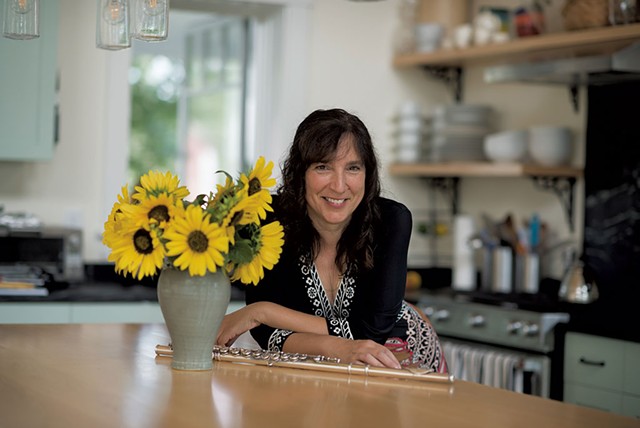
- Courtesy Of Caleb Kenna
- Karen Kevra
After an all-Johann Sebastian Bach concert given by the Montpelier music series Capital City Concerts last year, director and flutist Karen Kevra and her guest musicians, including soprano Hyunah Yu, convened at Kevra's house in Cornwall. The talk naturally turned to Bach. And that's when this weekend's concert was conceived.
"Last year, we were all feeling the enormity and darkness of the political scene," Kevra recalls. Realizing the midterm elections were a year away, they brainstormed around the question, "What sort of musical balm can we give to our audiences just ahead of the midterms?"
The answer: Bach's Magnificat, a joyful and moving 30-minute work scored for a celebratory crowd of five soloists, a chorus, and an orchestra with trumpets and timpani. The all-Bach program also includes the Brandenburg Concerto No. 2 in F major and three arias.
CCC's performance of the Magnificat, under Richard Riley's baton, will feature four soloists: Yu; French Canadian mezzo-soprano Julie Boulianne, singing the second soprano and alto parts; tenor Joshua Collier, who directs Barn Opera in Brandon; and David Tinervia, a Massachusetts-based baritone. Riley handpicked the 25 chorus members mainly from the Burlington Choral Society, which he directs, and the Onion River Chorus in Montpelier. An orchestra of 26 includes Kevra on flute and New York City-based Randall Wolfgang on the oboe d'amore, an instrument extant in Bach's time.
The Magnificat will be a balm for audiences not just because of its exalting music. Sung in Latin — "magnificat" means "magnifies," as in "My soul magnifies the Lord" — its text is the biblical Mary's answer to the news that she will soon be the Mother of God. Yet it has an oddly modern resonance. One verse reads, "He has thrown down the rulers from their thrones and lifted up the lowly." Another: "He has dispersed the arrogant of mind and heart."
"The words are striking, almost dangerous," comments violinist Lucy Chapman, a longtime Marlboro Music Festival participant who is currently on hiatus from 20 years of teaching at the New England Conservatory. "A rich king being laid low, a lowly servant girl being revered for generations. That's Mary, of course, but it's a little radical."
The Brattleboro-based violinist urges audiences to listen for two particularly dramatic moments in the music's 12 movements: the transition between movements three and four, in which the last note of the soprano solo doubles as the chorus' first note; and movement eight, featuring the tenor backed by violins in unison. Both moments are in F-sharp minor, departing from the cheerful D major in which the work is composed. In an afterthought, Chapman adds that the sixth movement — she breaks off to sing it — is "almost like a lullaby."
Riley is equally enamored of that transition from the third to fourth movement. "They're juxtaposed so that the cadence of one" — the slower, awe-filled soprano solo — "becomes the catapult into the other, an agitative, propulsive choral movement," he describes. "It's really exciting."
The conductor notes that the music's "sheer number of notes in a short time" requires a certain level of technical facility from the singers. But from an audience point of view, the 1733 work (based on a 1723 version) has always struck home. Riley cites the 2,000-plus performances of Magnificat in Bach's time, his own discovery of 276,000 listens to 10 online recordings he found, and the legions of audiences who heard it over the centuries.
"It's unbelievable how broadly communicative and important this piece is," Riley says.
"It's transcendent," Kevra declares. "It takes you to a deep, emotional plane — and, boy, do we need that right now."









Comments
Comments are closed.
From 2014-2020, Seven Days allowed readers to comment on all stories posted on our website. While we've appreciated the suggestions and insights, right now Seven Days is prioritizing our core mission — producing high-quality, responsible local journalism — over moderating online debates between readers.
To criticize, correct or praise our reporting, please send us a letter to the editor or send us a tip. We’ll check it out and report the results.
Online comments may return when we have better tech tools for managing them. Thanks for reading.